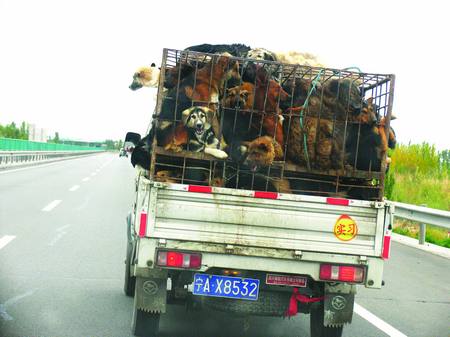Dog rescue efforts underway
Fifteen dogs died from the abuse they suffered on their way to the slaughterhouse, while another 20 frail canines await rescue from their fate as food when Beijing dog protectors arrive at Linhe, Inner Mongolia,Tuesday.
 |
|
A truck on the Beijing-Tibet Expressway carries over 30 dogs to a slaughterhouse on September 30. |
"One officer and one veterinarian rushed to Linhe today, and they'll arrive at 4 am tomorrow," Zhou Runrun, an officer of the China Small Animal Protection Association (CSAPS), said Monday.
Over 30 large dogs were spotted by a Beijing resident on the Beijing-Tibet Expressway on September 30. The animals were stacked and squeezed into the bed of a small truck, some already crushed to death, others barely alive, according to Zhou.
"I thought something was wrong and followed the truck immediately," said Li Huijia, the vegetarian restaurant manager who spotted the dogs. "And I called the local police to stop the truck."
But police said they had no authority to confiscate the dogs and let the truck go, so Li followed it to the slaughterhouse.
She was told by the truck driver, a dog dealer surnamed Jiang from Yinchuan, Ningxia Hui Autonomous Region, that the Linhe slaughterhouse regularly bought dogs from him to kill and serve to diners. Jiang was not sure if the dogs met food safety inspection and quarantine requirements.
"The strong dogs will be sold as pets, and the weak, sick and old will be killed and served at local restaurants," Li said the slaughterhouse manager told her.
Li was informed by Jiang that 15 dogs died during their first night in Linhe. She did not know what the slaughterhouse intended to do with the dead bodies.
The CSAPS tried to rescue the dogs once they heard the news. Instead they had to negotiate for half a month with the slaughterhouse that purchased the dogs until they agreed to sell the 20 that remained to CSAPS for 9,000 yuan ($1,355.40) total. The slaughterhouse had purchased the dogs from Jiang for 100 yuan ($15.05) each.
"We are deeply worried about the remaining dogs' health," Zhou said. "They might be killed, and the slaughterhouse may not give them enough food." She will rent a large truck to transfer the healthier dogs to Beijing, while the sick dogs will be sent to Baotou for treatment.
Zhou suggested the government regulate the restaurant industry on matters of serving such animals.
"People will never know from where the restaurants got the dogs, and whether they've died of disease before ending up on the table," Li said.
The dogs will be cared for by CSAPS at their center in Xibeiwang township, Haidian district, until they are restored to health, after which Zhou hopes they can be adopted into warm homes in Beijing.
 0
0 







Go to Forum >>0 Comments